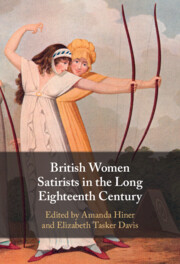Book contents
- British Women Satirists in the Long Eighteenth Century
- British Women Satirists in the Long Eighteenth Century
- Copyright page
- Dedication
- Contents
- Illustrations
- Notes on Contributors
- Acknowledgements
- Introduction
- Part I Traditions and Breaks
- Chapter 1 Women Writers and Juvenal
- Chapter 2 Unlocking the Dressing Room
- Chapter 3 Aphra Behn and Traditions of Satire
- Chapter 4 Delarivier Manley
- Chapter 5 The Pleasures of Satire in the Fables of Anne Finch
- Part II Publicity and Print Culture
- Part III Moral Debates and Satiric Dialogue
- Appendix Selected List of Eighteenth-Century Women Writers and Their Satiric Works
- Selected Bibliography and Guide to Further Reading
- Index
Chapter 2 - Unlocking the Dressing Room
Mary Evelyn’s Mundus Muliebris
from Part I - Traditions and Breaks
Published online by Cambridge University Press: 31 March 2022
- British Women Satirists in the Long Eighteenth Century
- British Women Satirists in the Long Eighteenth Century
- Copyright page
- Dedication
- Contents
- Illustrations
- Notes on Contributors
- Acknowledgements
- Introduction
- Part I Traditions and Breaks
- Chapter 1 Women Writers and Juvenal
- Chapter 2 Unlocking the Dressing Room
- Chapter 3 Aphra Behn and Traditions of Satire
- Chapter 4 Delarivier Manley
- Chapter 5 The Pleasures of Satire in the Fables of Anne Finch
- Part II Publicity and Print Culture
- Part III Moral Debates and Satiric Dialogue
- Appendix Selected List of Eighteenth-Century Women Writers and Their Satiric Works
- Selected Bibliography and Guide to Further Reading
- Index
Summary
Mary Evelyn’s Mundus Muliebris: Or, the Ladies Dressing Room Unlock’d, and her Toilette Spread was written before 1685 and published anonymously in 1690. The poem, accompanied by a preface and a dictionary of “hard and foreign names, and Terms of the Art Cosmetick,” aroused enough interest to require a second issue and a second edition within a year, followed by yet another edition in 1700. Significant textual evidence supports the claim that later male satirists borrowed without acknowledgement from her work. Further, significant evidence from the Evelyn family papers supports the claim that the teenage author, eulogized by her father John Evelyn as exceptional in her piety, demurred from his angelic portrayal. Her published poem about an imaginary dressing room, in combination with unpublished documents found in her actual dressing room, and in contrast to male-authored works that borrowed from her, establishes a perspective on her single but significant contribution to the history of women and satire. Mundus Muliebris ridicules the marriage marketplace and its effects on women’s bodies and minds. Exposed to a prospective husband, the dressing room’s lavish space documents women’s involvement in that marketplace, in all its glittering, dehumanizing, disturbing, and at times disgusting detail.
Keywords
- Type
- Chapter
- Information
- British Women Satirists in the Long Eighteenth Century , pp. 45 - 64Publisher: Cambridge University PressPrint publication year: 2022

